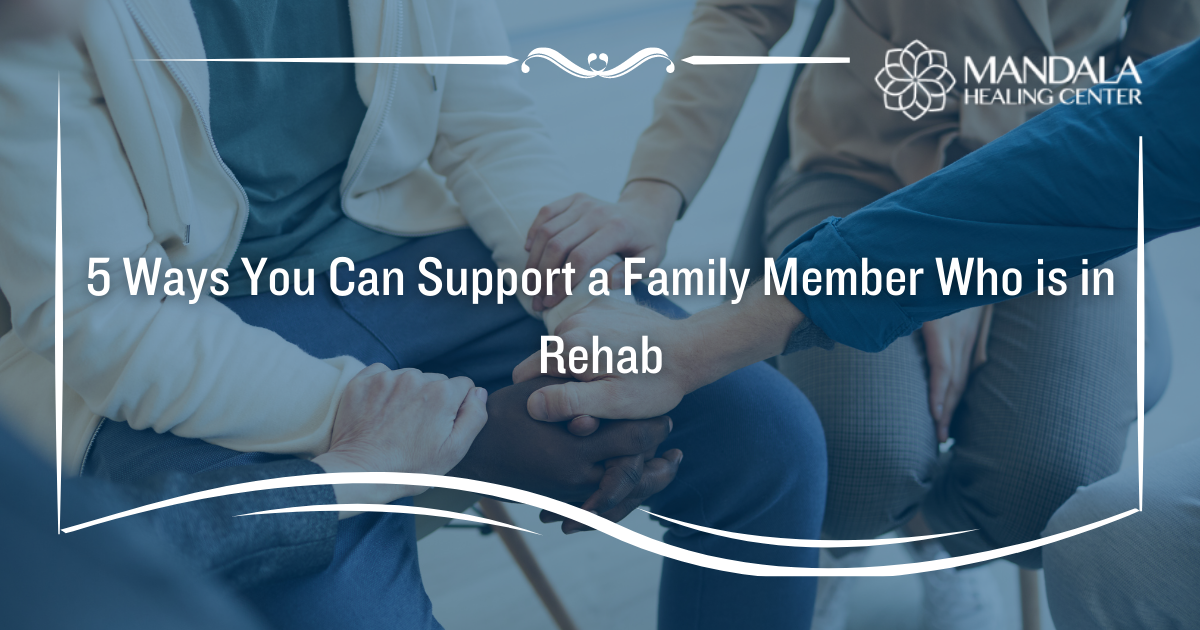Family support and involvement in recovery are extremely important. Studies have shown that people who have the support of their families are more likely to enter treatment, stay in treatment, complete treatment, and even stay sober after treatment than people whose families are not involved in their recovery.[1]
The role of the family in recovery begins as soon as the discussion of rehabilitation begins, and it should continue during and after treatment. But how can you support a family member who is in rehab, especially if they are staying in a residential facility?
Here are 5 ways to support a loved one during rehab.
1. Go Visit Your Loved One During Rehab
While visits and contact with the outside world are generally limited during the first week or so of rehab, family support and involvement in the treatment process are highly encouraged. The vast majority of drug and alcohol rehab centers allow patients to have visitors during approved visitation hours. If your family member is open to the idea of a family visit and if his or her therapist thinks it’s a good idea, consider scheduling a visitation with your loved one.
Although rehab visits are usually brief, this is a great way to show your loved one that you care about his or her well-being and are dedicated to supporting them in their recovery journey.
2. Participate in Family Therapy or Family Day
One of the best ways to support a family member who is in rehab is to participate in family therapy or family day. Many addiction treatment centers facilitate family therapy sessions that provide you and your family with an opportunity to discuss problems within the family unit, improve your communication skills with one another, and educate the entire family on the disease of addiction. Family therapy sessions are a safe, structured, and mediated opportunity to discuss sensitive topics or painful emotions. They can truly bring the whole family together.
Family day, on the other hand, is a day when multiple families may be invited to the rehab center to see how the facility operates on a day-to-day basis. They may sit in on therapy sessions, participate in family workshops, and get educated about the treatment and recovery process. Attending family day can demonstrate to your loved ones just how dedicated you are to helping them stay sober.
3. Extend Your Help by Taking Care of Their Responsibilities
Does your loved one have a dog, cat, or another pet in the home who needs to be cared for while they go to a residential program? Or, does your loved one have kids who need to be picked up from school during the hours they are in outpatient therapy? If so, these are two great ways to offer to help and extend your support while a family member is in rehab.
Many responsibilities don’t go away when a person goes to rehab. Pets, kids, housework, and even live plants need tending to. The thought of personal responsibilities going unmet can stop a person from accepting help in the first place, but it can also serve as a distraction while someone is trying to get healthy.
Rather than allowing your loved one to worry about his or her responsibilities outside of recovery, ask them how you can help or offer your help wherever you see fit. Even little acts of kindness can go a long way in keeping your loved one’s spirits high during their healing journey.
Aside from pet-chare and child-care, other small tasks you could volunteer to take care of include:
- Checking the mail
- Collecting bills and arranging payments for them
- Watering the plants
- Mowing the lawn
4. Letters, Cards, Phone Calls, and Care Packages
Addiction treatment centers allow their patients to write and accept letters, make phone calls, and even receive care packages. Getting involved in this manner is one of the easiest ways to get involved, but it can also brighten your loved one’s day immensely. Sometimes, all it takes to cheer up is to get a card or care package from someone who loves you. Just be sure to follow the treatment center’s policies on what is and what is not allowed in care packages if you choose to go that route.
5. Prepare For Your Loved One’s Discharge
Another great way to support a family member who is in rehab is to help prepare for them to return home after treatment. You can do this by:
- Emptying the home of any drugs and alcohol
- Arranging transportation from the rehab facility back to their home
- Cleaning their home or room for them so they have a tidy place to return to
- Stocking their pantry or fridge with a few groceries
- Making a list of local 12-step meetings or other resources they may benefit from
You may also begin participating in a 12-Step support group, yourself, such as Al-Anon. Groups that are dedicated to supporting family members of addicts and alcoholics can help you learn about your loved one’s addiction as well as understand what your role is in supporting them.
Find Help for an Addicted Loved One Today
Watching a loved one struggle with addiction can bring about a rollercoaster of painful emotions, but there is help available. Here at Mandala Healing Center, our family-focused addiction treatment program uses a holistic approach that provides each and every patient with the resources they need to achieve long-term sobriety.
If you or a loved one are struggling with addiction, please contact us today. A dedicated admissions specialist is available 24-hours a day to take your call and help you get started on the road to recovery.
References:












